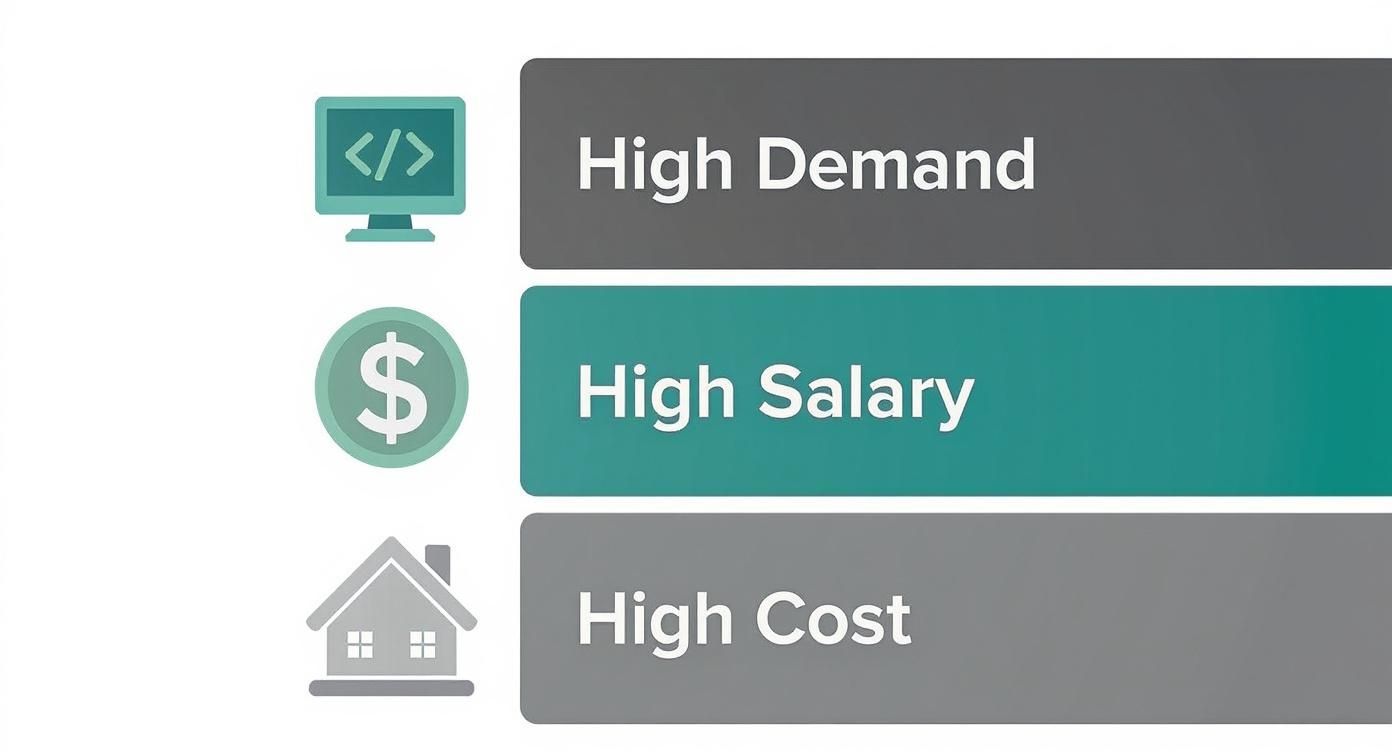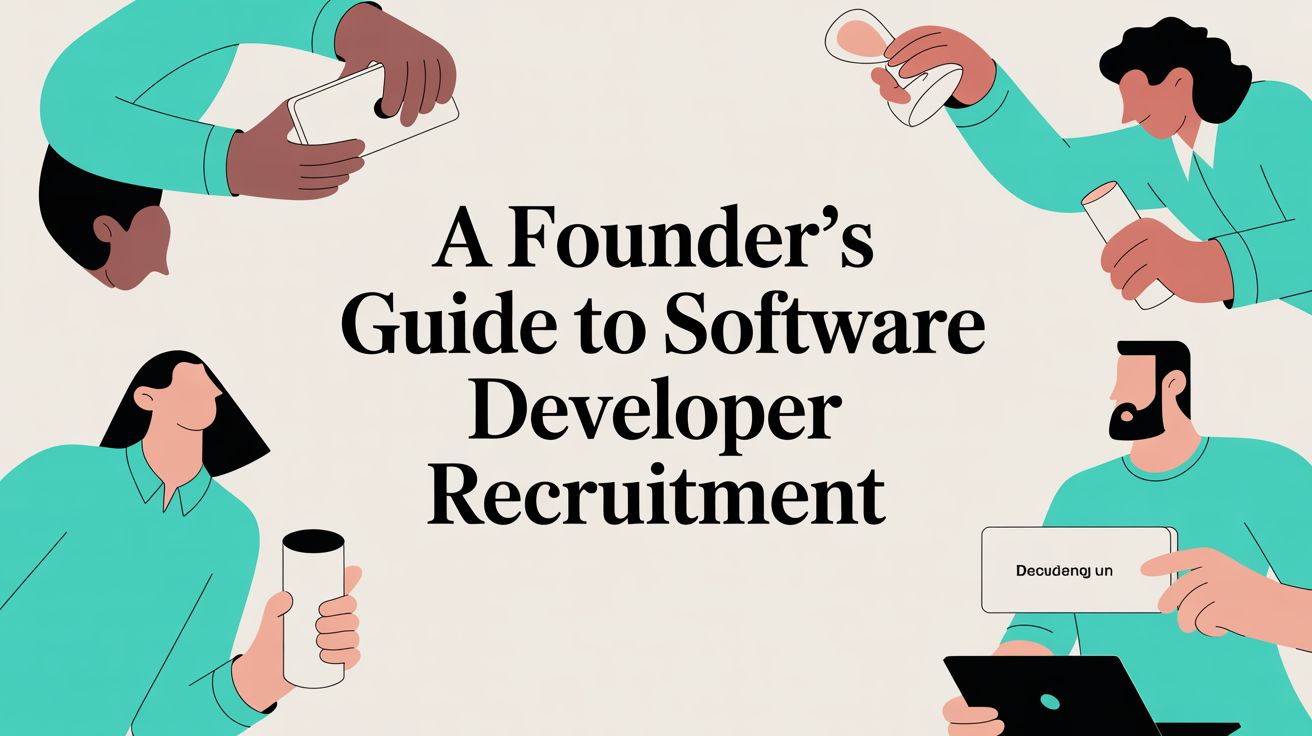
Landing a job at a San Francisco startup is like stepping onto a bullet train—it's high-stakes, high-reward, and moves at an incredible speed. This isn't just another job hunt; it's an entry into a world defined by ambitious goals, competitive salaries, and a culture that demands you adapt or get left behind. Your success hinges on understanding this unique landscape before you even think about hitting "apply."
Navigating the search for San Francisco startup jobs can feel overwhelming. The market is buzzing with energy, packed with opportunity, and moves faster than almost anywhere else on the planet. Even with headlines about tech layoffs, San Francisco is still the global epicenter for venture capital and groundbreaking ideas, especially in hot fields like artificial intelligence, cloud infrastructure, and full-stack development.
The reality on the ground is a fascinating paradox: demand for talent is sky-high, but so is the competition. While companies are desperate for the right people, they’re also incredibly selective. In this environment, specialized skills aren't just a bonus—they're the table stakes.
San Francisco's cost of living is legendary, but let's be real—so are its salaries. The whole game is about understanding how those two things balance out. Tech roles here command some of the highest pay in the world for a reason: to compensate for the steep price of rent, food, and just about everything else. This creates a financial dynamic you won't find in many other cities.
Here’s a quick, actionable snapshot of what’s driving the market right now:
This chart really drives home the trade-offs you'll be making when you consider a startup role in the city.

What this shows is a core truth of the Bay Area: the promise of those high salaries is directly tied to the intense demand for very specific skills and, of course, the significant cost of living here.
To give you a clearer picture, here’s a quick comparison of average tech salaries against key cost of living metrics. It’s a reality check that helps put the eye-popping salary numbers into perspective.
This table isn't meant to scare you off, but to equip you with a realistic financial baseline. While the costs are high, the compensation structure at most startups is designed to offset them, especially when you factor in the long-term potential of equity.
The data paints a clear picture of a market that's both resilient and hungry for talent. In 2025, tech roles make up a whopping 11.6% of total employment in the Bay Area—that's double the national average. The average tech salary is hovering around $185,425, which significantly outpaces other hubs like Seattle and Boston. That premium helps offset living costs that are nearly 170% higher than the rest of the country.
Even with market corrections, the relentless demand for expertise in AI, cloud computing, and data science keeps the hiring engine running.
The key takeaway is simple: the barrier to entry is high, but the rewards are equally substantial. Companies will pay a premium for talent that can walk in the door and deliver immediate value in a fast-paced, product-obsessed culture.
Getting your head around this balance is the first crucial step. Before you start scrolling through job boards or hitting up networking events, you need to align what you can do with what the market desperately needs. For a deeper dive into the mechanics of the search, check out our complete guide on how to find a startup job.
If you want to land the best San Francisco startup jobs, you have to look beyond the massive, generic job boards. The most exciting opportunities are hiding in plain sight on curated platforms, within venture capital networks, and through specialized newsletters. This strategic approach saves you time and ensures you’re only talking to serious players.
Instead of blasting your resume into the void, you'll focus your energy where it actually counts.
The most effective job searches happen on platforms built for the startup world. These aren't just lists of jobs; they're curated marketplaces where companies are actively, and often urgently, looking for top talent.
For example, a platform like Underdog.io flips the traditional model. You create one anonymous profile, and it gets shown to hundreds of vetted startups. Hiring managers then reach out to you, which is a powerful signal of interest right from the start. This approach immediately cuts through the noise, connecting you with companies that are genuinely interested in your specific skills. It’s a much more discreet and efficient way to see what's out there without broadcasting your job search.
Here's another highly effective strategy: go straight to the source of startup funding—venture capital firms. Top-tier VCs like Andreessen Horowitz (a16z), Sequoia Capital, or Accel all have dedicated "jobs" or "portfolio" pages on their websites.
These pages are absolute goldmines. Here’s a practical, step-by-step way to use them:
The real advantage here is discovering promising, early-stage companies that may not have the budget for massive job board postings but are actively hiring foundational team members. You get ahead of the curve.
To make your profile even more competitive, it's a good idea to identify specific areas of expertise you can highlight. You might even consider exploring valuable certifications for jobs that align with the types of roles you're seeing. And for anyone serious about building a career in this space, our guide to the best startup job boards offers even more curated resources to dial in your search.

Let's get one thing straight about San Francisco's startup scene: your resume might get you in the door, but your network gets you the interview. This isn't about collecting business cards. Real connections are built on genuine interest and mutual value.
The goal is to build a professional presence long before you ever need to ask for a job.
Your online activity is your modern-day calling card. Platforms like LinkedIn and X are goldmines, but only if you use them to build relationships, not just broadcast that you're looking for work.
Here’s a simple, actionable strategy:
A huge mistake people make is sending that bland, default "I'd like to connect" message. Instead, try this template: "Hi [Name], I saw your post on [X/LinkedIn] about scaling your data infrastructure. I've been tackling similar challenges with [specific technology] and was really impressed by your approach to [specific point]. Would love to connect and follow your work."
This simple tweak changes the dynamic from a request to a peer-to-peer conversation.
The Bay Area's tech world runs on events, from huge conferences to small, niche meetups. Showing up is your chance to turn online contacts into face-to-face acquaintances.
San Francisco’s ecosystem holds the number one global ranking for a reason. It's home to over 15,000 active startups, creating a ridiculously dense network of talent and opportunity. This environment is constantly being refreshed by smart grads from places like Stanford and UC Berkeley, and it thrives on a tech-savvy user base that’s always eager to try new products. Actionable Step: Use Meetup.com or Eventbrite and search for terms like "AI meetup," "SaaS networking," or "product management SF." Attend one event a month to start building real-world connections.
This potent mix of top-tier talent, venture capital, and an engaged community makes it an unparalleled place to find San Francisco startup jobs. You can read more about what makes the city a top startup hub.
Startup interviews move at a different speed. They're less about reciting your resume and more about showing your problem-solving chops, cultural fit, and raw potential in real-time. The process for landing San Francisco startup jobs is intense, fast, and laser-focused on finding people who can deliver from day one.
The entire loop is designed to test your resilience and adaptability. You're not just being evaluated for a role; you're being vetted as a potential core member of a tight-knit team.
While every startup has its own flavor, the interview process usually follows a predictable pattern. Knowing what’s coming helps you prepare.
The typical flow looks something like this:
For a comprehensive way to master these stages, you should explore a strategic framework for interview preparation designed for professionals.
Startups don't ask fluff questions. They dig into your thinking process and ability to handle ambiguity. Be ready for questions that test how you think, not just what you know.
The best candidates don't just answer the question asked; they explain the why behind their answer. They show their work, articulate their assumptions, and demonstrate a clear, logical approach to solving complex problems.
For example, a product manager might hear, "Our user engagement has flatlined. Walk me through how you'd diagnose the problem and propose a solution in your first 90 days."
Actionable Response Framework:
The current market has made startups even more selective. With the Bay Area tech sector cutting around 8,700 jobs in early 2025, companies are only hiring candidates who can make an immediate and undeniable impact. You can get more insights on the recent shifts in the Bay Area tech job market to understand the landscape better.

When you get an offer from a startup, it's about much more than just the salary. It's a puzzle of base pay, potential upside from equity, and benefits. Getting this right is critical when you're looking at San Francisco startup jobs, because the real long-term value often hides below the surface.
It's a huge mistake to focus on just one number. You have to look at the whole package as a portfolio: guaranteed cash (salary) balanced against the potential future value of your equity, all while ensuring your day-to-day needs are covered.
Equity is easily the most confusing—and potentially most valuable—part of any startup offer. It's your slice of ownership, usually given as stock options. These options give you the right to buy company shares at a fixed strike price. The dream is that the company takes off, making your shares worth far more than your purchase price.
For a deeper dive into how this all works, our guide on startup equity basics for job seekers is a must-read.
Your equity grant is only as valuable as the company's future success. Always ask about the company's current valuation, total shares outstanding, and funding stage to get a realistic sense of what your options could one day be worth.
To help you get started, here's a breakdown of the key equity terms you'll run into.
Understanding these terms is your first line of defense in making sure you're getting a fair deal.
Negotiating is part of the game. Ground your salary request in solid market data (use sites like Levels.fyi for comps), not just what you made at your last job. If they can't move on salary, ask for more equity or a one-time signing bonus.
Remember, other benefits have a huge impact on your finances.
By looking at the complete picture—salary, equity, and benefits—you can properly evaluate an offer and negotiate a package that truly reflects your worth.
Thinking about diving into the San Francisco startup scene? You probably have a ton of questions. Let’s tackle some of the most common ones with direct, actionable insights.
Honestly, it helps. A lot. While remote work is a thing, many SF startups favor hybrid models to build culture. If you’re applying from out of state, you need to proactively address the relocation question.
If you're targeting fully remote roles, remember the competition is global, so your profile must be flawless.
It’s valued, but it's not the golden ticket it once was. San Francisco startups care more about what you can do. Can you solve real problems and contribute from day one?
Actionable Proof: A strong GitHub portfolio with well-documented personal projects is often more compelling than a college degree. For example, building a simple web app using a popular framework like React and deploying it demonstrates end-to-end skills. Contributions to open-source projects or a detailed technical blog also serve as powerful evidence of your capabilities.
If you’re actively searching with in-demand skills, plan for a two to four-month journey. This covers networking, applying, interviewing, and negotiating. The market moves fast, but processes can still take time.
Patience and persistence are key. Actionable Tip: Start networking before you officially begin your search. Dedicate an hour a week to engaging on LinkedIn or attending a virtual meetup. Building warm connections early can seriously shorten your timeline by getting you referred directly for roles.
Ready to cut through the noise and connect directly with hiring managers at top SF startups? Underdog.io flips the script by having vetted companies apply to you. Create your free, anonymous profile in 60 seconds and let the opportunities find you.

